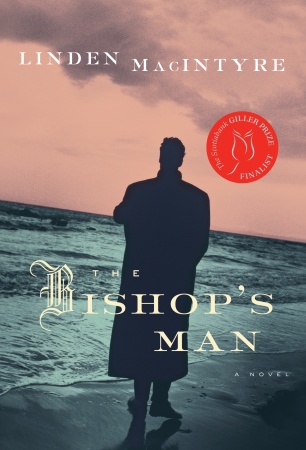Reading makes you nicer. In case you were looking for another great reason to savour a quality piece of fiction this summer, there it is. You can read this Time editorial if you want to know the details. The editorial also covers "carnal versus spiritual reading." (And yes, typically reading a novel would fall into the latter category.) We are becoming a society that does too much reading for information's sake and not enough reading for enjoyment's sake. As a Primary teacher and lover of fiction, this freaks me right out. Like the environmental citizen who drives a Prius or buys only organic just to do his/her part, I decided to up my ratio of spiritual to carnal reading this summer, just to do what I can to counteract the depletion of love for literature in our society.
I just had to figure out a way to work the carnal vs. spiritual thing into a post about Linden MacIntyre's The Bishop's Man, the latest novel to entertain my brain. The book is about a Canadian Catholic priest who specializes in keeping the notorious "sins of the Fathers" out of the spotlight. (Ah? You see the spiritual vs. carnal connection now?) This novel won the 2009 Giller Prize. And yes, it's CBC's Linden MacIntyre who co-hosts the fifth estate. So basically you're looking at a low-risk investment here if you're after a good read. Guaranteed return on your time, folks.
What I thoroughly enjoyed about MacIntyre's writing was his ability to capture thought patterns. He brings the reader in, out and through narrator Father McAskill's layers of memories and creates a collage of detail that allows the reader to understand McAskill's past and present as one complicated, organic whole.
The language is beautiful as well. MacIntyre is able to call attention to words through protagonist Father MacAskill's love of of them. The story is anchored in Canadian geography and explores themes of family, community and masked identity.
I stood in the hotel room bathroom to finish this one. (It was late. My husband needed sleep and I needed light to get through the last few chapters.) It's that good. Five out of five stars for this spiritual read.

1 comment:
I think the idea of spiritual reading is a good one! Very often, the philosophers of times past miss the point of the liberal arts and of fiction (whether drama or epic); Augustine and Plato are both suspicious of poets, although it is clear that Augustine enjoyed the theatre and quotes Vergil constantly. Seneca also quotes Vergil constantly, but says that the liberal arts are not that important because they do not contribute to growth in virtue. Jerome expresses himself as torn between his cultured and Christian selves.
But is it really the case that fiction -- novels, epics, plays -- does not contribute to character and virtue? I mean, Augustine and Seneca were deeply versed in poetry and the fictional narratives of their culture before they started composing philosophy. How could they truly separate out the different aspects of themselves? And, as you alluded to in a different post, research shows that reading novels can increase empathy. Furthermore, I think the creation of a well-balanced, 'adjusted' internal life -- whatever that looks like for each individual -- makes 'happiness' ('felicitas' for the Latin philosophers) more attainable, and makes it easier for the individual to make 'good moral choices.' Finally, fiction can explore the world of philosophy and morality in ways that a treatise or essay cannot -- the attentive reader can grow as a moral/virtuous individual through careful reading and ingesting of the story itself.
All hail not only ambiguity but the spiritual reading of epics, plays, and novels!
Post a Comment